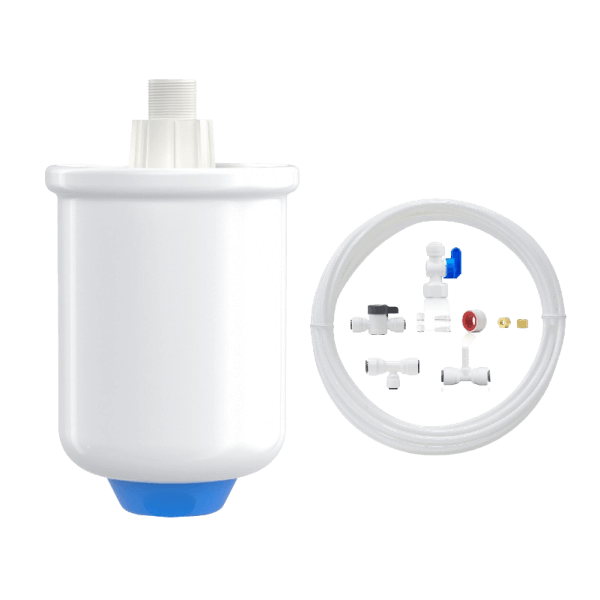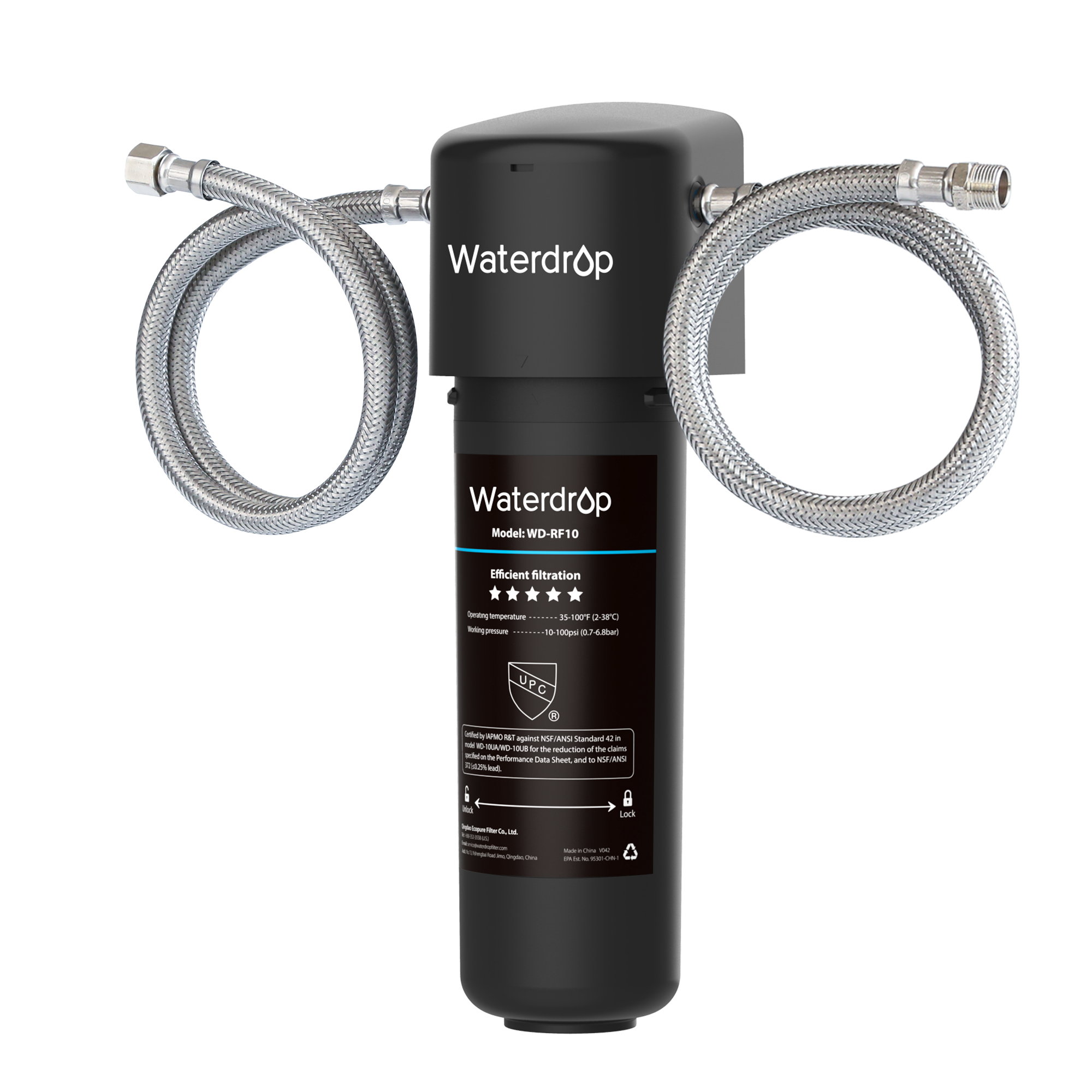L’eau contient-elle des calories ?
par Dr. Jonathan Doyle - Updated January 19, 2024
Contrairement aux boissons riches en sucre ou en arômes, l'eau est une alternative saine et essentielle pour réduire son apport calorique. Maintenir un niveau d'hydratation adéquat est essentiel à un mode de vie sain, car cela facilite la perte de poids et favorise de nombreux processus corporels. Lorsqu'on essaie de perdre du poids, l'une des questions les plus fréquentes est : « L'eau est-elle calorique ? » Quel est le nombre de calories de l'eau ? Ai-je le droit de boire de l'eau ? Poursuivez votre lecture pour trouver la réponse précise à cette question.
La composition de l'eau
Un atome d'oxygène (O) et deux atomes d'hydrogène (H) constituent la formule chimique de l'eau, H₂O . Les capacités extraordinaires de l'eau découlent directement de sa structure moléculaire simple. L'eau peut paraître simple, mais elle est indispensable à la vie telle que nous la connaissons.
Outre son importance pour la vie, l'eau présente plusieurs caractéristiques uniques. Sa polarité lui permet de dissoudre une grande variété de substances, ce qui permet aux organismes vivants de réaliser des interactions chimiques essentielles. De plus, l'eau possède une grande capacité thermique, ce qui contribue à réguler la température des organismes vivants et de leur environnement.
Un aspect essentiel des molécules d'eau est la formation de liaisons hydrogène, qui renforcent la cohésion des molécules d'eau et contribuent à la stabilité des structures biologiques, telles que les cellules. Ces caractéristiques uniques mettent en lumière la fonction indispensable de l'eau en tant que solvant universel, élément essentiel à l'existence de la vie et au bon fonctionnement de nombreux systèmes.

Que sont les calories ?
Qu'il s'agisse d'une cuillère à café ou d'un pouce, une calorie est une unité de mesure. La décomposition et l'absorption des aliments par l'organisme libèrent des calories. Plus vous consommez de calories, plus votre corps peut produire d'énergie. Si vous consommez plus de calories que nécessaire, votre corps stockera l'excédent d'énergie sous forme de graisse pour assurer le bon fonctionnement de l'organisme. Même pauvres en matières grasses, les aliments peuvent être riches en calories. Toute forme de stockage calorique supplémentaire peut entraîner une accumulation de graisse dans l'organisme.
En nutrition, les calories désignent la quantité d'énergie absorbée par une personne grâce à la consommation d'aliments et de boissons, ainsi que la quantité d'énergie dépensée lors d'activités physiques. Le nombre de calories est indiqué dans les informations nutritionnelles imprimées sur l'emballage de chaque aliment. De nombreux régimes alimentaires accordent une importance particulière à la restriction calorique.

L'importance des calories
Pour fonctionner efficacement, votre corps a besoin de calories comme source d'énergie. Cette vitalité est essentielle au bon fonctionnement de votre organisme. Pour maintenir un poids stable, votre corps a besoin de la même quantité de nutriments provenant des aliments et des boissons que des autres sources.
Votre poids peut fluctuer si vous consommez et brûlez des calories à des rythmes différents . Par exemple, si vous consommez plus de calories (alimentaires ou de boissons) que vous n'en brûlez, vous prendrez du poids. Votre corps transforme l'énergie excédentaire en graisse, ce qui est à l'origine de ce phénomène. Pour perdre du poids, vous consommerez probablement moins de calories (alimentaires ou de boissons) que vous n'en brûlez pendant l'exercice. En effet, votre corps utilise ses réserves de graisse comme source d'énergie.
Quelle quantité de calories y a-t-il dans un verre d’eau ?
L'eau ne contient aucune calorie, 0 gramme de protéines, 0 gramme de glucides et 0 gramme de matières grasses. Le potassium, le calcium, le fluorure, le fer et le sodium ne sont que quelques-uns des minéraux qu'elle peut contenir, selon son origine et son distillat ou sa filtration. L'eau est un excellent moyen de maintenir une bonne hydratation et peut contenir divers minéraux. Plusieurs eaux aromatisées ou améliorées contiennent des électrolytes ou des vitamines.

Certaines variétés d’eau contiennent des calories, tandis que d’autres n’en contiennent pas.
Malgré cela, de nombreuses eaux fabriquées aujourd'hui contiennent des calories. Si vous trouvez l'eau plate fade, essayez les boissons gazeuses ou aromatisées. Certaines n'apportent aucune calorie, mais la plupart en contiennent des quantités faibles à modérées. Voici quelques exemples :
eau gazeuse
L'acide carbonique et le dioxyde de carbone dissous constituent l'eau gazeuse, également appelée boisson énergisante selon la marque. Pour fabriquer de l'eau gazeuse, on peut ajouter des arômes organiques ou des minéraux à l'eau filtrée. Cela permet d'en rehausser le goût ou de produire des bulles. Les édulcorants artificiels sont largement utilisés dans les boissons énergisantes, même s'ils ne contiennent généralement pas de calories.

Si vous souhaitez en savoir plus sur le nombre de calories contenues dans l'eau gazeuse, vous devriez lire l'article suivant : https://www.nutritionix.com/food/sparkling-water .
Liqueurs sportives
Si l'objectif principal des boissons sportives est de garantir l'hydratation des athlètes pendant leurs entraînements, elles peuvent également inclure des calories provenant des glucides et des électrolytes, contribuant ainsi à la reconstitution des nutriments et de l'énergie. Les glucides contribuent à la restauration des niveaux de glycogène, améliorant ainsi l'endurance . Cependant, il est essentiel de se concentrer sur la quantité totale de calories, en particulier pour ceux qui suivent un régime alimentaire spécifique.

Eau de coco enrichie d'ingrédients supplémentaires
Bien que l'eau de coco pure soit reconnue pour son faible apport calorique naturel, certains produits disponibles à la vente peuvent contenir des modifications. Certaines variantes incluent des arômes ou des sucres supplémentaires, augmentant ainsi l'apport calorique total. Bien que les produits à base d'eau de coco contiennent des électrolytes et des propriétés hydratantes intrinsèques, il est conseillé aux consommateurs de vérifier attentivement les étiquettes afin de vérifier si des calories supplémentaires ont été ajoutées.

Jus de fruits
Bien qu'il soit dérivé de fruits et contienne plusieurs vitamines et minéraux essentiels, le jus de fruit contient néanmoins des sucres naturels, contribuant ainsi à son apport calorique total. Plusieurs facteurs peuvent influencer sa teneur en calories, notamment le type de fruit, le mode de transformation (fraîchement pressé ou industriel) et la présence ou non de sucres ou d'édulcorants supplémentaires.
Il est essentiel pour ceux qui contrôlent leur consommation de calories, comme ceux qui tentent de perdre du poids, d’être conscients du fait que le jus de fruits contient des calories et d’envisager de le prendre avec modération.

Les bienfaits de la consommation d'eau pour la santé
L'eau est essentielle à notre santé. Elle est nécessaire à plusieurs processus biologiques, tels que l'évacuation des déchets, la protection des organes et des articulations, le contrôle de la température corporelle et la nutrition des cellules.
Dans tous les cas, privilégiez l'eau potable. Privilégiez-la plutôt que les boissons sucrées comme les sodas ou les jus, riches en calories et contenant des sucres simples comme le sucre.
Il produit du mucus et de la salive
La salive hydrate la bouche, le nez et les yeux, ce qui facilite également la digestion. L'usure est ainsi réduite. Boire de l'eau contribue également à maintenir une bouche saine. Elle peut également réduire le risque de caries dentaires lorsqu'elle est utilisée comme alternative aux boissons sucrées. Elle soutient les parties du corps particulièrement fragiles, comme le cerveau et la moelle épinière.
L'hypoxie peut affecter la composition et le fonctionnement du cerveau. De plus, elle joue un rôle dans la production d'hormones et de neurotransmetteurs. Une déshydratation prolongée peut affecter la capacité de raisonnement et de réflexion.

Il est essentiel au fonctionnement du système digestif
L'eau est essentielle au bon fonctionnement des intestins. La déshydratation peut entraîner des troubles digestifs, de la constipation et une acidité gastrique importante. De ce fait, le risque d'ulcères et de brûlures d'estomac est accru.
Il gère la température du corps
Il est essentiel de boire suffisamment d'eau pour maintenir une température corporelle stable. Par la transpiration, le corps perd de l'eau lorsque vous pratiquez une activité physique ou que vous êtes exposé à une température plus élevée que d'habitude.
La transpiration contribue à rafraîchir le corps. Cependant, si vous ne compensez pas l'eau perdue par la transpiration, votre température corporelle peut augmenter. En effet, la déshydratation épuise le plasma et les électrolytes de votre corps, ce qui est néfaste pour la santé.
Aide à prévenir la constipation
Consommer des fibres n'est pas le seul moyen de prévenir la constipation ; d'autres options existent. Il est également essentiel de maintenir une consommation d'eau régulière pour garantir une quantité suffisante d'eau dans les selles. Une alimentation pauvre en fibres, en magnésium et en eau peut augmenter le risque de constipation.
Vous pourriez perdre quelques kilos
Les personnes qui consomment deux verres ou plus de liquide par jour ont tendance à consommer moins de calories et moins de sucre, de sel et de matières grasses. Les personnes qui boivent plus d'eau semblent également consommer moins de sel. Cela implique qu'une bonne hydratation peut favoriser la perte de poids.
Les calories superflues et sucrées que beaucoup de gens consomment avec leurs repas devraient être remplacées par plus d'eau. Occupant plus de place dans l'estomac, l'eau accélère le métabolisme et procure une sensation de satiété plus rapide.

Peut-on boire trop d’eau ?
Lorsque les femmes ne boivent pas suffisamment d'eau, elles sont plus susceptibles de développer des calculs rénaux et des infections urinaires (IVU) , des maladies qui affectent le système urinaire. Votre capacité à penser et à agir efficacement, ainsi que le fonctionnement de vos glandes salivaires, peuvent en être affectés, et cela peut également entraîner une déshydratation. Cependant, saviez-vous qu'une consommation excessive d'eau est possible ?
Cette maladie potentiellement mortelle, appelée hyponatrémie, peut être causée par une consommation excessive d'eau. De ce fait, le taux de sel dans le sang devient trop dilué. Une consommation excessive d'alcool avant un exercice physique intense, comme un marathon, peut parfois provoquer ce phénomène. Si le lait maternisé est très dilué, il peut également être sujet à une consommation excessive d'eau.
Les personnes souffrant d'insuffisance cardiaque, de maladie hépatique ou d'insuffisance rénale chronique ont une capacité réduite à éliminer l'eau de leur organisme. Si vous êtes concerné par l'un de ces problèmes, consultez votre médecin pour savoir quelle quantité d'eau vous buvez.
Réflexions finales
Maintenir un niveau d'hydratation suffisant est essentiel au maintien de fonctions physiologiques essentielles et donc à la santé générale. Boire suffisamment d'eau favorise la sensation de satiété et constitue une alternative saine aux boissons riches en calories pour gérer son poids. Il est essentiel de bien comprendre l'influence du choix des boissons sur la quantité de calories absorbées par l'eau. Pour adopter un mode de vie plus sain et équilibré, il est essentiel de connaître ses besoins en hydratation, de faire les bons choix en matière de boissons et d'accorder la plus grande importance à l'eau.
De nos jours, la qualité de l'eau est un enjeu crucial, car elle est étroitement liée à notre santé. Notre gamme de filtres à eau par osmose inverse et notre système d'osmose inverse domestique sont certifiés par des organismes professionnels pour fournir la meilleure eau du robinet possible, adaptée au fonctionnement quotidien de notre organisme et à nos besoins en matière de perte de poids, ainsi qu'aux besoins en eau potable de notre famille. Pour améliorer votre consommation d'eau au quotidien, pourquoi ne pas envisager nos produits ?









